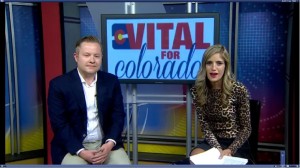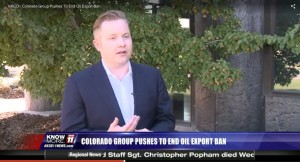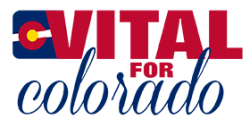Deft Communications specializes in helping our clients prepare for all manner of presentations, whether it’s going on camera as a spokesperson, delivering a keynote speech to a large auditorium, or simply conducting a small team meeting. This blog series will periodically provide best practices for any type of presentation you do.
I recently had the honor of serving as spokesman for Vital for Colorado during a series of Western Slope stakeholder meetings. Over the course of two days, I did three on-camera interviews for television (one live, two pre-recorded – which you can view here, here, and here), one radio interview, and one print interview that has yet to be released.
While our practice focuses mostly on getting our clients ready for their speaking engagements, we’re happy to serve as spokespeople ourselves when the need arises. However, keeping the goal of client service and prep at the forefront of our counsel, below are a few television interview tips I’m happy to share after doing three of them in Grand Junction earlier this month. Keep these in mind for the next time you’re presented with the opportunity to speak on behalf of your organization. And if you’d like additional help, you know where to find us.
-
Prepare as much as possible
This seems like obvious advice, but it’s amazing how many people believe they can “wing it.” When the cameras are rolling, an interviewer is staring at you, and you’re suddenly drawing a blank on what your own name is, you’ll be glad you prepared.
In terms of how to get prepared, ask a few questions. Will this interview be pre-recorded or is it live? The difference here is huge. In a pre-recorded interview, you can start over. If you mess up, just start again. Reporters want a smooth presentation just as much as you do because watching someone trip over their words makes for bad television. So, if you stumble or make a mistake, simply start again. In a live interview, no such luxury, which will alter the way you prepare.
-
Find out the questions in advance
Contrary to what the most paranoid part of our brains would have us believe – and no matter what Donald Trump says – the media generally isn’t out to get you. Confrontational journalism certainly has its place, but the vast majority of the time, members of the media are seeking to be effective conduits of knowledge to a curious public.
In service of those goals, help the reporter with facts. Send a press release or media kit in advance. When it comes time for your interview, show up early. Inquire about what they plan to ask you on camera. If they ask why, tell them you want to be as accurate as possible in representing your organization, so if there are specific facts that are noteworthy, you want to make sure you get them right. This will also help you anticipate any curveballs.

In my live interview in Grand Junction, I asked Emily beforehand what she was going to ask me about. Most of the questions were straightforward, but she had a question that I hadn’t really prepped for. Since I was early, and since I just plain asked her what she planned to talk about, I was able to formulate a response and practice it. Everything went well, and it was certainly better than being blindsided.
-
Take a breath and be calm
Going into any engagement with the media, you’re bound to be nervous. Unless you’re a trained spokesperson, and you do this every day, you’re bound to be on pins and needles. I had never done live television before, and my adrenaline was pumping.
But I think about one of my good buddies who played football in high school. He told me he’d be so amped up before a game that he’d feel like he wanted to vomit, but that once he hit someone for the first time, he’d calm down. The same principle applies here. Once you answer the first question, assuming you’ve practiced your talking points, then you’re just in it. And before you know it, the whole thing’s over.
What a rush!
-
Know your talking points
This might be the most important tip I can give you. In a pre-recorded interview, the reporter will likely ask you what feels like the same question in a bunch of different ways. It’s not up to you to come up with new and inventive ways of answering the same question, so just hit your points again and again. You know what’s important, and what you want to convey in this piece, so stick to it. It may feel repetitive, but in the five minutes or so they’re interviewing you, they’ll use maybe a sentence of yours. Make it count and make sure it’s the key point you want you to get across.
-
Remember you’re the expert
Today’s newsrooms are understaffed, and many reporters will lean on what you provide them. You’re the expert in your field, so have confidence. Again, the overwhelming majority of reporters are not “out to get you.” Work with them, treat them with respect and professionalism, and you’ll optimize the opportunity. Provide background material beforehand and ask if they have any questions. Doing good prep work will ensure you, your client or organization, and the news organization get the most out of this engagement.
-
Keep your feet and your head quiet
A practical tip before we end this post. Movements are amplified on camera, so try to keep your feet from moving too much, and keep your head relatively still. This feels unnatural for me as I have what one of my high school theater directors referred to as “happy feet,” but it’s key in not making physical movement a distraction during your piece. Getting on-camera practice with professional instructors can be helpful with this.
Like most things, doing television interviews can be a self-fulfilling prophecy. Visualize yourself doing well will usually lead you to practice, prepare, and work collaboratively with your interviewer resulting in a good piece. Fretting about it and failing to optimize your approach will produce less than stellar results.
So be confident, do good prep, remember these television interview tips and when all else fails, call a professional.

